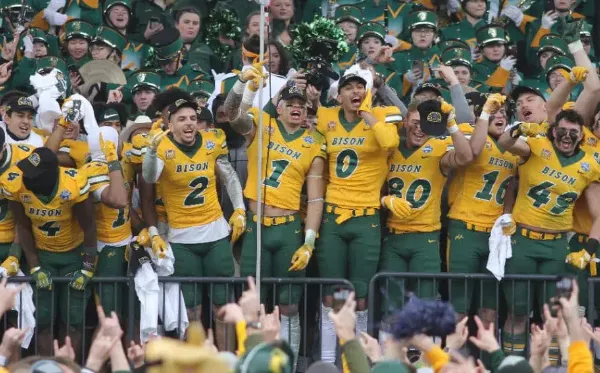The Mountain West Conference (MWC) is reportedly exploring the possibility of adding North Dakota State University (NDSU), a dominant force in the FCS, to its ranks as a football-only member, according to a recent tweet from Brett McMurphy. While no formal invitation has been extended, this marks the first concrete indication that an FBS conference is seriously considering the Bison.
Currently, the MWC is seeking to expand by one or two football-only members. With Northern Illinois’ interest in joining the conference reportedly dwindling, this leaves the door open for NDSU, which could potentially begin competing in the MWC as soon as 2026. However, the Bison may not be eligible for the FCS playoffs in 2025 as they transition to the FBS.
For years, speculation has swirled around the idea of NDSU leaving the FCS, with many considering it an inevitable move for a program that has outgrown its current level of competition. If NDSU makes the jump, the university would remain in the Summit League for most of its other sports, saving on travel costs, while shifting its football program to a higher-profile, higher-competition league.
Implications for the FCS and Beyond
The potential departure of NDSU from the FCS would have significant ramifications, both for the Bison and the larger football landscape. On one hand, NDSU has been a staple of FCS success, winning nine national championships since 2011, and their absence would undoubtedly weaken the competition. Without the Bison, the road to an FCS title would become more open for other teams, but it would also diminish the prestige of the playoffs, particularly in terms of fan engagement and attendance. The tradition of Frisco, Texas hosting the national championship game could also suffer, with fewer marquee matchups.
On the other hand, some argue that NDSU’s departure could be a positive development for both the FCS and the Bison program. FCS fatigue has set in for NDSU’s fan base, many of whom feel their team’s repeated dominance in the subdivision has led to diminishing returns in terms of excitement and engagement. Critics argue that as more programs make the jump to the FBS, the competitive landscape of the FCS has suffered, and NDSU’s departure could open the door for new storylines and fresh contenders to emerge.
Additionally, there’s a sense that NDSU’s rise in the FCS has created a unique set of circumstances. While the Bison’s success has helped elevate the profile of the subdivision, it has also made the FCS feel like an increasingly irrelevant level of competition. The Bison’s success has left fans and media in Fargo increasingly detached from the FCS, with many feeling the league no longer presents meaningful challenges for a program of NDSU’s caliber.
The Future of the FCS Without NDSU
If NDSU does leave, the effects on rival schools like South Dakota State (SDSU), the University of North Dakota (UND), and the Montana schools could be significant. These programs, who are still firmly rooted in the FCS, could find themselves struggling to fill the void left by NDSU’s departure. SDSU, which has built a competitive rivalry with the Bison, may now face an uncertain future in terms of maintaining national relevance in the absence of their longtime nemesis.
Fans of schools like Montana and Montana State may see an opportunity to claim FCS titles more easily without NDSU standing in their way. But this could come at a cost, as the overall strength of the FCS would be diluted without the Bison’s prominence.
For the broader FCS landscape, the loss of its top brand might result in a reset—potentially opening the door for more parity. As programs like Idaho, Sam Houston State, and Kennesaw State have made the jump to the FBS in recent years, the FCS has had to adjust to a new reality. While it may seem like a blow to lose NDSU, some experts argue that the future of the subdivision could be brighter if more teams can step into the vacuum left behind by the Bison’s departure.
A New Era for NDSU Athletics
The move would not only reshape the FCS but would also represent a new chapter for NDSU athletics, which has long been the face of the subdivision. The Bison’s successful run in the FCS has brought national attention to the league, with Frisco becoming synonymous with FCS football during NDSU’s championship years. The program’s success has also sent several players to the NFL, further cementing NDSU’s place in the sport’s broader landscape.
For NDSU’s fanbase, the transition to the FBS could reignite excitement, though it could also mark the end of an era of dominance in the FCS. The Bison have often been accused of “outgrowing” the FCS, and a move to the MWC could provide the program with new challenges and opportunities for growth. But the shift would also signal the end of one of the most successful dynasties in college football history.
Looking Ahead: What’s Next for the Bison and the FCS?
Ultimately, the question remains whether NDSU will make the leap to the Mountain West, and if so, when. If the Bison do join, it could be the beginning of a major shift in college football, with the FCS losing its most successful program and potentially redefining the balance of power.
For now, speculation will continue to swirl, with hard opinions on both sides of the debate. Whether NDSU’s departure is a blessing or a curse for the FCS remains to be seen, but there’s no doubt that the ripple effects will be felt across college football for years to come.
Related topics:
- Patrick Industries to Attend Baird’s 2024 Global Industrial Conference
- Rusty Surfboards Shifts Production Back to U.S. for 40th Anniversary
- Are Griffin and Crosby Colapinto the Best Brother Duo in Surfing?

